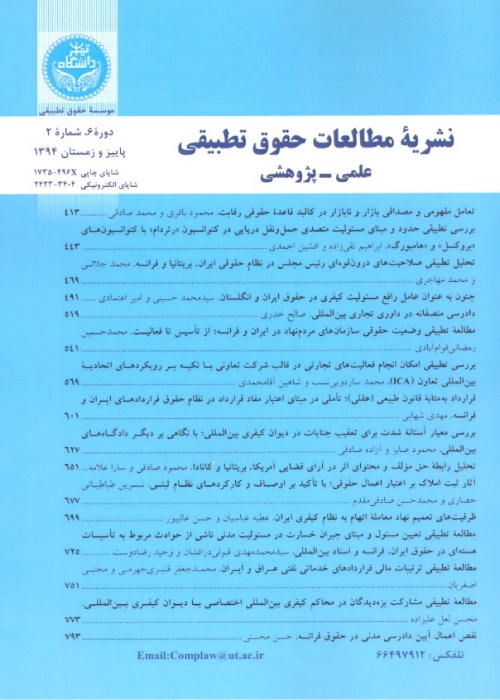Types of the family in the case law of the European Court of Human Rights, with presenting Islamic analysis
Author(s):
Article Type:
Research/Original Article (دارای رتبه معتبر)
Abstract:
Context and
Aim
When examined issues related to family, the concept and types of the family is assumed as an obvious fact. However, with deep fundamental differences between different perspectives, may be this types offered by each of the schools of thought and law do not match together. As far as in some cases, this discrepancy has progressed to the point of general contradiction. In this regard, in order to create a common understanding of the different concepts and types of the family in Islam and the West, in this paper case law of the European Court of Human Rights will be studied. Which is one of the most important human rights judicial institutions and its case law and practice in the field of international law has the legal validity. In this article the case law of the European Court of Human Rights has been examined as an example of thinking based on secular ideas. Also, the view of Islam on the issues raised in the cases of the Court was studied to explain the issue.Research Method
The present article, with a legal approach and based on an analytical exploratory research, seeks to answer the question that; what is the types of the family in western societies? And what do the findings, which are based on the case law of the European Court of Human Rights, what does it have to do with Islamic culture?Findings
After studying the procedure of the European Court of Human Rights and the Islamic perspective, we found that: The scope of relationships that include the legal protection of the right to family life based on the court's practice is much narrower than the concept of family or Rahem in Islam, which is under the special protection of Islamic legislator and these relationships cannot be severed under any justification. Some of these relationships are consistent with what is supported and emphasized in Islam under the title of “Sele Arham"[1]; such as the relationship between spouses, parents and children, grandparents, sisters, brothers and aunts and uncles. Among these, some of these relationships are not only unacceptable in Islam, rather, heavy punishments are also enforced. Such as free relationship based on sexual orientation outside marriage contract and illegitimate relationship which in case of approving such relationship under ‘family’, it would lead to family breakdown and degeneration as defined by Islam and tradition and would cause disorder in nurturing children and future generations.Conclusion
Finally, the important point to consider is that from Islamic viewpoint, family is defined based on the lineal and marriage and the existence or absence of the aforementioned basic elements are not effective in approving or disapproving relationship within family life. However, the European Court of Human Rights procedure despite the importance of genetic relations(lineal) and relations based on marriage, the basic elements within the court procedure are determining and effective when identifying and approving relations based on family life in such a way that in certain cases when there are basic elements for clarifying family at court without genetic relations, the relationship is described as family and even in some other cases in spite of genetic relations, in case of absence of basic elements, the relationship is not regarded within family life but recognized as private life. In fact, it is the humanistic approach that in court procedure the mutual enjoyment is considered as a basic element in family and based on this notion by overlooking legal frameworks such as the principle of marriage between man and woman within family, attempts are made to change these frameworks and offer newly emerging definitions on family. Unlike the Islamic view, the concept and examples of family within the western views are variable and are described based on social norms. Hence, the courts unlike the Islamic viewpoint do not consider marriage only based on religious teachings for family formation and development as it has been stressed upon many times. Therefore, considering the absence of compatibility of this thinking with religious obligations, and the intertwining of public morality with the Iranian public interests within Islamic topics, the enforcement by the governance and its compatibility with human rights issues in Iran, it has led to protect the Islamic views for our country. Since issues such as white marriage and homosexuality and other illegal sexual orientation can in no way be compatible with the Islamic doctrine and it would seriously contradict public morality and our national interests. 1. The Principle of Continuity Devotion to Family.Keywords:
Language:
Persian
Published:
Comparative Law Review, Volume:14 Issue: 1, 2023
Pages:
55 to 84
magiran.com/p2597283
دانلود و مطالعه متن این مقاله با یکی از روشهای زیر امکان پذیر است:
اشتراک شخصی
با عضویت و پرداخت آنلاین حق اشتراک یکساله به مبلغ 1,390,000ريال میتوانید 70 عنوان مطلب دانلود کنید!
اشتراک سازمانی
به کتابخانه دانشگاه یا محل کار خود پیشنهاد کنید تا اشتراک سازمانی این پایگاه را برای دسترسی نامحدود همه کاربران به متن مطالب تهیه نمایند!
توجه!
- حق عضویت دریافتی صرف حمایت از نشریات عضو و نگهداری، تکمیل و توسعه مگیران میشود.
- پرداخت حق اشتراک و دانلود مقالات اجازه بازنشر آن در سایر رسانههای چاپی و دیجیتال را به کاربر نمیدهد.
In order to view content subscription is required
Personal subscription
Subscribe magiran.com for 70 € euros via PayPal and download 70 articles during a year.
Organization subscription
Please contact us to subscribe your university or library for unlimited access!



